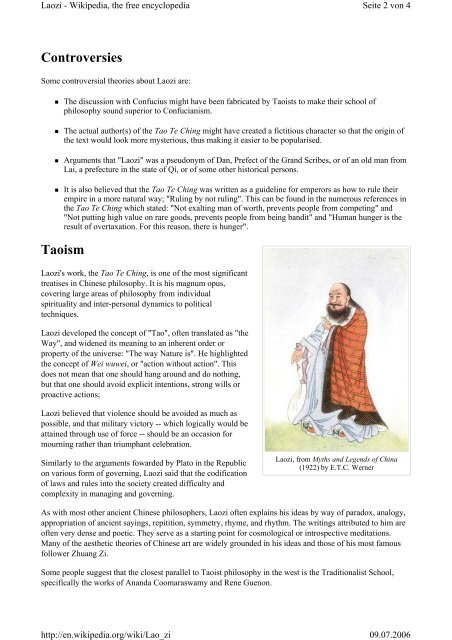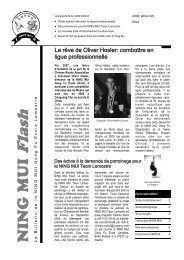Laozi
Laozi
Laozi
Create successful ePaper yourself
Turn your PDF publications into a flip-book with our unique Google optimized e-Paper software.
<strong>Laozi</strong> - Wikipedia, the free encyclopedia<br />
Controversies<br />
Some controversial theories about <strong>Laozi</strong> are:<br />
The discussion with Confucius might have been fabricated by Taoists to make their school of<br />
philosophy sound superior to Confucianism.<br />
The actual author(s) of the Tao Te Ching might have created a fictitious character so that the origin of<br />
the text would look more mysterious, thus making it easier to be popularised.<br />
Arguments that "<strong>Laozi</strong>" was a pseudonym of Dan, Prefect of the Grand Scribes, or of an old man from<br />
Lai, a prefecture in the state of Qí, or of some other historical persons.<br />
It is also believed that the Tao Te Ching was written as a guideline for emperors as how to rule their<br />
empire in a more natural way; "Ruling by not ruling". This can be found in the numerous references in<br />
the Tao Te Ching which stated: "Not exalting man of worth, prevents people from competing" and<br />
"Not putting high value on rare goods, prevents people from being bandit" and "Human hunger is the<br />
result of overtaxation. For this reason, there is hunger".<br />
Taoism<br />
<strong>Laozi</strong>'s work, the Tao Te Ching, is one of the most significant<br />
treatises in Chinese philosophy. It is his magnum opus,<br />
covering large areas of philosophy from individual<br />
spirituality and inter-personal dynamics to political<br />
techniques.<br />
<strong>Laozi</strong> developed the concept of "Tao", often translated as "the<br />
Way", and widened its meaning to an inherent order or<br />
property of the universe: "The way Nature is". He highlighted<br />
the concept of Wei wuwei, or "action without action". This<br />
does not mean that one should hang around and do nothing,<br />
but that one should avoid explicit intentions, strong wills or<br />
proactive actions;<br />
<strong>Laozi</strong> believed that violence should be avoided as much as<br />
possible, and that military victory -- which logically would be<br />
attained through use of force -- should be an occasion for<br />
mourning rather than triumphant celebration.<br />
Similarly to the arguments fowarded by Plato in the Republic<br />
on various form of governing, <strong>Laozi</strong> said that the codification<br />
of laws and rules into the society created difficulty and<br />
complexity in managing and governing.<br />
Seite 2 von 4<br />
<strong>Laozi</strong>, from Myths and Legends of China<br />
(1922) by E.T.C. Werner<br />
As with most other ancient Chinese philosophers, <strong>Laozi</strong> often explains his ideas by way of paradox, analogy,<br />
appropriation of ancient sayings, repitition, symmetry, rhyme, and rhythm. The writings attributed to him are<br />
often very dense and poetic. They serve as a starting point for cosmological or introspective meditations.<br />
Many of the aesthetic theories of Chinese art are widely grounded in his ideas and those of his most famous<br />
follower Zhuang Zi.<br />
Some people suggest that the closest parallel to Taoist philosophy in the west is the Traditionalist School,<br />
specifically the works of Ananda Coomaraswamy and Rene Guenon.<br />
http://en.wikipedia.org/wiki/Lao_zi<br />
09.07.2006



